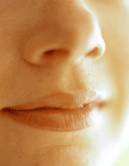
THURSDAY, June 18, 2015 (HealthDay News) — People with facial paralysis may benefit from cosmetic lip surgery, a preliminary study finds.
Facial paralysis is “a very large problem that can occur because of stroke, Bell’s palsy, muscular dystrophy, trauma and birth defects,” Dr. Kofi Boahene, a facial plastic and reconstructive surgeon at Johns Hopkins University School of Medicine in Baltimore, said in a university news release.
Poor lip control caused by facial paralysis can cause drooling, spillage of food and drink, and difficulty making sounds that require fully closing the lips, such as the letters “b” and “p.”
Many of these people are also self-conscious about their appearance, Boahene said.
He and his colleagues worked with 22 people who had facial paralysis on one side of the mouth and three people with muscular dystrophy who had lost control of both sides of the mouth.
The patients were given hyaluronic acid injections, a cosmetic procedure to make lips appear fuller. Hyaluronic acid injections are commonly used to reduce facial wrinkles and lines, and to ease and cushion the aching joints of people with arthritis, the researchers said.
The greatest improvement was seen in the three muscular dystrophy patients, who had a six- to seven-fold increase in lip strength. Among those with paralysis on one side of the mouth, lip strength improved an average of 1.4 times on the paralyzed side and 0.4 times on the non-paralyzed side, the study found.
All 25 patients showed notable improvement in their ability to speak and to eat and drink without spillage, according to the study published June 18 in the journal JAMA Facial Plastic Surgery.
A larger study with about 100 patients is being planned.
Hyaluronic acid lip injections cost between $500 and $2,000, the researchers say, and last about a year. If the patients in this study continue to show improvement without any significant side effects, Boahene said he may explore longer-lasting treatments, such as removing fat from elsewhere in the body and injecting it around the mouth.
More information
The U.S. National Institute of Neurological Disorders and Stroke talks about Bell’s palsy.
Copyright © 2026 HealthDay. All rights reserved.

